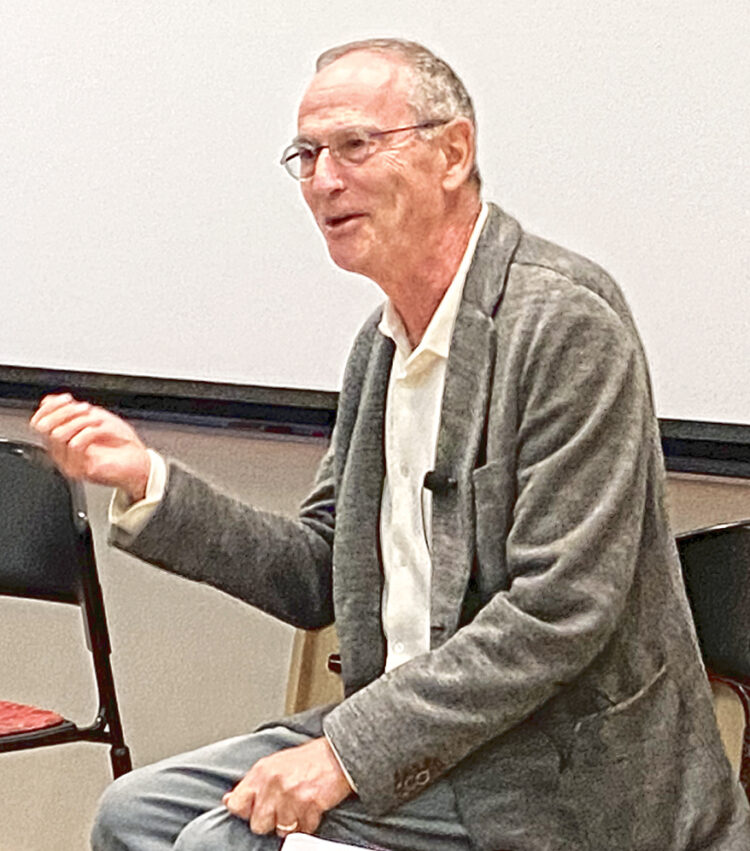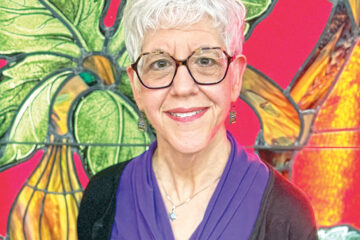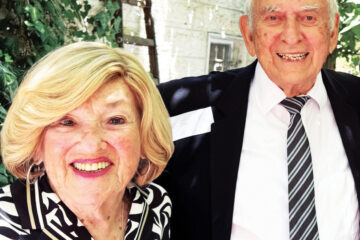Veteran Israel correspondent Martin Fletcher talks candidly at UD about Hamas.

‘For me, it’s very real and very personal.’
By Marshall Weiss, The Dayton Jewish Observer
Martin Fletcher says he’s been to Gaza at least 50-60 times and to the West Bank a hundred times or more as a journalist. He was NBC’s Israel correspondent for 26 years until his retirement in 2010. For 15 of those years, he served as bureau chief there too.
He’s covered the First and Second Intifadas. And he still serves as a special correspondent on a contract basis for NBC. But Fletcher says it wasn’t until the Oct. 7 Hamas massacre that he fully understood the terror group’s real intent.
“It’s not about the destruction of Israel. It’s about actually killing the Jews,” he says Oct. 29 at a program co-sponsored by the JCC’s Cultural Arts & Book Series and the University of Dayton Department of Communication.
“Hamas and the anti-Zionism demonstrations around the world in support of a ceasefire and amazingly in support of Hamas — you wonder how is that possible?
And, their answer partly is, ‘It’s not about Jews. It’s about Israel. It’s about the occupation. It’s about cruelty, etc., etc.’
“What I can tell you is all the times I’ve been in the West Bank and Gaza — I’ve been to many, many demonstrations, I’ve been there during the different wars and the different fighting. Not one time, never did I ever hear a crowd of Palestinians during fighting say, ‘Israelis are coming. Here are the Israelis.’ Not even one time. It’s only ‘Kill the Jews’ and it’s about the Jews. Sometimes they say just the army. But mostly it’s Yahud. Jews.”
Fletcher is on tour for his latest book, Teachers: The Ones I Can’t Forget. He cuts that presentation short to answer questions about Gaza.
“Some of you may know that two of my family members were hostages,” he says. “And they were the first ones released (Judith Raanan, 59, and her 17-year-old daughter, Natalie). But they’re not celebrating and the family’s not celebrating, to a person. Because although those two were released, three members of the family were killed. And eight members of the family are still hostages.”
He emphasizes that it’s not just the story of his family but of many families near the Gaza border.
“For me, it’s very real and personal. I got a call this morning from a couple of cousins who are coming to Chicago and New York to work on behalf of the eight still-held hostages. The family’s become extremely active and a real critical force, I think, in Israel. They’re not letting this question die.”
With people around the world demonstrating in support of Hamas, he wonders if they know the terror group’s raison d’être is to kill the Jews.
“Do they know that? Or do they know and really don’t care? Do they agree with it? I don’t know.”
Fletcher says he’s not surprised by student anti-Israel demonstrations at colleges and universities in the U.S.
“Frankly, excuse me, they don’t know much,” he says. “If somebody has a well-thought-out position, and this is the position he chooses, good for him, and to be anti-Israel after you’ve looked at the stuff in the situation. That’s totally fair. But at the same time, I don’t believe in killing Jews.”
He says college students tend not to have enough understanding of what’s going on. He cites the accusation that Israel is committing genocide against the Palestinians of Gaza.
“Do you know what genocide is? The deliberate targeting of a nation or group in order to wipe them out. That’s what the Germans did to the Jews. That’s what Hamas wants to do to the Jews.
“The Jews don’t want to kill those civilians. They’ve asked them to leave the battle zone, so they don’t kill civilians. It’s a tragedy what’s happening to the Palestinians. But it’s not on purpose, it’s not deliberate. People may be demonstrating because of Israel, and there are many good reasons to do that. Though at the same time, you have to understand that what they’re supporting is a terrorist group that wants to kill Jews.”
Fletcher asks rhetorically if it’s ever justifiable to rape women and kill them in front of their children, or to cut off Jews’ hands and feet.
“What else do you need to see in order to believe they (Hamas) mean what they say? My truth is not the same as their truth. And I will never persuade one of those guys that I’m right. And they’ll never persuade me that I’m wrong. Now, it seems to me, either you want to kill the Jews, or you don’t. That’s frankly how I see the world.”
He notes that antisemitism in the Middle East goes back well before Israel’s 1967 occupation of the West Bank and Gaza, territories it captured in the Six-Day War.
“Well, the Holocaust was before Israel, 69 Jews were massacred in Hebron in 1929, before Israel. This has been going on for a long time. The idea that Israel at all had anything to do with it is obviously nonsense.”
Even so, Fletcher says he believes that peace in the Middle East is still possible.
“If you want peace, at a certain point, you’ve got to forget about the past. If you look at a choice between justice and peace, justice means you’re going to get some kind of revenge on someone for whatever they did. But that’s looking backward.
“In the end, if you want to go forward, if you want peace, there’s never been a peace agreement in history — a real peace agreement — in which one side got everything. Six million dead Jews and Israel’s best friend is now Germany. There’s 30,000 Israelis living happily now in Berlin. The British and Northern Ireland, they made peace. American vets now go to Vietnam on holiday to meet Vietnamese fighters. Yes, it’s possible. But both sides have got to give up a lot.”
When asked what advice he gives editors and correspondents about how to fairly report what’s going on in the Middle East, he says he never sought objectivity.
“My wife’s Israeli, my three sons were born there, they were in the army, half the family is on kibbutzim and in the army. My advice is don’t try and be objective. You’re going to have a very strong feeling one way or the other. What you must be is fair and accurate. Get it right. And be fair to both sides.”
To read the complete December 2023 Dayton Jewish Observer, click here.





